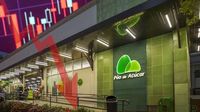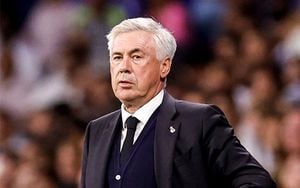The Grupo Pão de Açúcar (GPA), a prominent player in Brazil's grocery sector, faced a turbulent market reaction following the release of its first-quarter results on Monday, May 5, 2025. The company reported disappointing financial figures that led to a significant drop in its stock price, marking a challenging chapter for the supermarket chain.
According to a statement from GPA, investor Rafael Ferri, founder of GTF Capital, has reduced his direct and indirect stake in the company to 2.37% of the total number of common shares. This reduction is notable as Ferri had previously increased his stake to 5.86% just a few weeks earlier, on April 16, 2025. The decision to decrease his holdings was characterized as being 'strictly for investment' purposes.
In a recent interview, Ferri expressed a constructive outlook regarding GPA, stating, "The company should be worth much more; the price is far from reality." His remarks reflect a broader sentiment about the supermarket's potential, despite the current challenges it faces.
GPA's financial results for the first quarter of 2025 revealed a net revenue of R$ 4.8 billion, a decrease from R$ 5.15 billion in the previous quarter and a slight increase from R$ 4.62 billion in the same quarter last year. The gross profit stood at R$ 1.265 billion, up 14.3% year-on-year but down 10.7% from the previous quarter. The gross margin improved to 27.6%, indicating some operational resilience amidst the downturn.
However, the adjusted EBITDA fell to R$ 409 million, reflecting a 17.9% decline from the previous quarter. This decline contributed to a net loss from continuing operations of R$ 93 million, which, while an improvement from a loss of R$ 211 million in the last quarter, still raised concerns among analysts.
Market reactions were swift and severe. By 11:40 AM on Tuesday, May 6, GPA's shares had plummeted over 16%, the largest drop on the Ibovespa index, prompting the stock to enter an auction phase. Analysts from Itaú BBA noted that while GPA maintains one of the most resilient business models in the market, the turbulent macroeconomic conditions and high interest rates present significant challenges. They highlighted that the adjusted net loss of R$ 281 million exceeded their expectations of R$ 206 million.
Amidst these financial struggles, GPA's management is looking to new leadership to navigate the company towards recovery. CEO Marcelo Pimentel expressed confidence in the newly elected board of directors, which includes Ferri, stating, "The curriculum of the new board gives us high confidence that we have people to support us in this process." The new board was elected during an Extraordinary General Meeting (AGE) held on May 5, where Ferri received 320.8 million votes, securing one of the nine available positions.
Despite the positive sentiment surrounding the new board, analysts remain cautious. The adjusted net debt has risen to R$ 4.75 billion, resulting in a leverage ratio of 5.7x ND/EBITDA over the last three months. This figure is concerning, especially when compared to 3.8x in the previous quarter and 4.2x in the same period last year. GPA's cash consumption of R$ 1.6 billion during the quarter further complicates the company's financial outlook.
Investment firms have responded to GPA's performance with caution. BB Investimentos downgraded its recommendation for GPA's stock to neutral, setting a price target of R$ 30. Similarly, BTG Pactual and Itaú BBA maintained a neutral stance, citing ongoing concerns about the company's indebtedness despite recent operational improvements.
As GPA moves forward, the focus will be on the effectiveness of the new board in implementing strategies that can bolster the company's financial health and market position. With the backdrop of a challenging economic environment, the next few months will be critical for GPA as it seeks to regain investor confidence and stabilize its stock performance.
In conclusion, the recent developments at GPA underscore the complexities of navigating a competitive retail landscape while managing financial pressures. The company's ability to adapt and respond to these challenges will be closely watched by investors and analysts alike, as the supermarket chain strives to reclaim its footing in the market.




